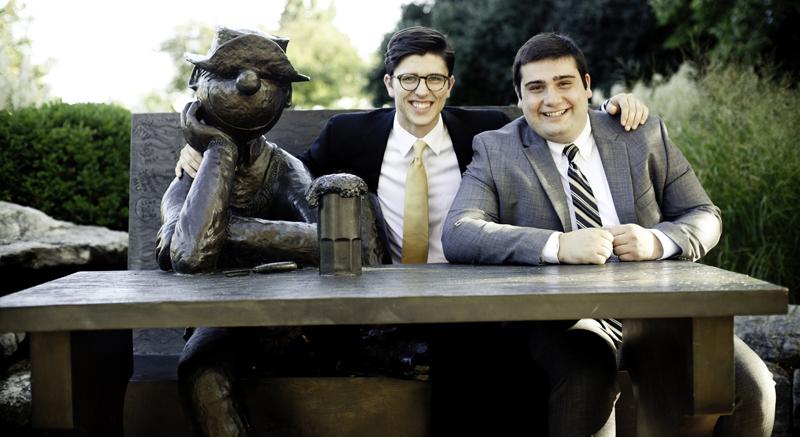Juniors Luke Blackburn and Connor Hickox, one of four slates running in the Missouri Students Association presidential race, want to unite MU.
The goal has been the slogan and focus of their campaign.
“Part of unity is coming together to one single student voice,” vice presidential candidate Hickox said. “When we’re advocating for different political changes or culture changes on campus, everything kind of comes back to unity.”
Blackburn, the slate’s presidential candidate, and Hickox began planting the seeds to their unity-based campaign shortly before spring break last year, they said. The pair met through the Mizzou Alternative Spring Break Program.
Both are experienced with MSA; Blackburn was executive chief of staff at the end of former MSA President Xavier Billingsley’s term, and Hickox was the MSA Student Affairs Committee chairman until he stepped down this semester. Each is a former MSA senator.
The slate’s emphasis on unity is rooted on three core tenets: spirit, connection and advocacy. Each was formed after the slate compiled the points and programs it wanted to emphasize in its platform, Blackburn said.
The first, spirit, focuses on bringing light to the accomplishments of students and student athletes across campus, Blackburn said.
“(With) spirit, a lot of people think of people think of sports games, and that’s part of it definitely,” Blackburn said. “But we want to make people proud about everything Mizzou has to offer.”
Accomplishing the tenet involves cooperation with Mizzou Spirit, the Alumni Association Student Board and the Student Athletic Advisory Council, according to the slate’s website.
Part of the opportunity as MSA president and vice president is an ability to hear the voice of the students, Hickox said. In conversations with administrators, the candidates have understood that an important role of MSA is connecting students to necessary resources stemming from that voice.
This led to the second tenet: connection. The candidates said they want to connect MSA with organizations on campus to better serve the students in those organizations as well as connect students with resources that allow them to be successful.
Successfully connecting MU’s campus and its students involves support to improve gender-neutral accommodations, working directly with MSA auxiliaries and partnering with a multitude of organizations, including the Student Success Center and International Center, according to the slate’s website.
The candidates also said they want to explore connecting auxiliaries such as KCOU and the College Music Committee and other auxiliaries with KCOU and MUTV. Such partnerships have the potential to create marketing opportunities and co-programming for events, Hickox said.
A large portion of unity entails inclusivity and decreasing discrimination at MU. Blackburn said as soon as he stepped foot on campus his freshman year, he felt welcomed into the MU family, a feeling he said is absent for some students.
“Certain things, like a preferred name policy and changing the non-discrimination policy really work to do that for other students who may have been marginalized in the past,” Blackburn said.
The effort to make MU more inclusive rounds out the slate’s third tenet: advocacy. Conversations with administrators have helped form the details of the platform and what might be attainable if the slate were elected, Hickox said.
One meeting that spurred ideas for the slate was with Struby Struble, the coordinator of the LGBTQ Resource Center. The candidates went into the meeting with a goal in mind to increase the number of gender-neutral bathrooms on campus but were steered in a different direction by Struble.
“She said the first need for LGBTQ students and what their community really wants to see is that anti-discrimination policy change,” Blackburn said.
Interaction with faculty closely associated with the slate’s platform is evident in the details on the slate’s website, Hickox said. A large point of the meetings was to gauge the feasibility of their platform and if everything mentioned was practical.
“We know exactly what we want to do and we have clear, solid plans to make those things happen,” Hickox said. “We really tried to avoid putting fluff statements in our platform or promising things we couldn’t do.”
Despite already having a platform in place, it is still growing, the slate said. By interacting with students and faculty, ideas are still being crafted as next month’s election inches closer.
“The student body hasn’t seen everything from us yet,” Blackburn said.








